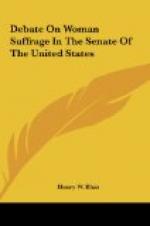But it is impossible to conceive of the suffrage as a right dependent at all upon such an irrelevant condition as sex. It is an individual, a personal right. It may be withheld by force; but if withheld by reason of sex it is a moral robbery.
But it is said that the duties of maternity disqualify for the performance of the act of voting. It can not be, and I think is not claimed by any one, that the mother who otherwise would be fit to vote is rendered mentally or morally less fit to exercise this high function in the state because of motherhood. On the contrary, if any woman has a motive more than another person, man or woman, to secure the enactment and enforcement of good laws, it is the mother, who, beside her own life, person, and property, to the protection of which the ballot is as essential as to the same rights possessed by man, has her little contingent of immortal beings to conduct safely to the portals of active life through all the snares and pitfalls woven around them by bad men and bad laws which bad men have made, or good laws which bad men, unhindered by the good, have defied or have prostituted, and rightly to prepare, them for the discharge of all the duties of their day and generation, including the exercise of the very right denied to their mother.
Certainly, if but for motherhood she should vote, then ten thousand times more necessary is it that the mother should be guarded and armed with this great social and political power for the sake of all men and women who are yet to be. But it is said that she has not the time. Let us see. By the best deductions I can make from the census and from other sources there are 15,000,000 women of voting age in this country at the present time, of whom not more than 10,000,000 are married and not more than 7,500,000 are still liable to the duties of maternity, for it will be remembered that a large proportion of the mothers of our country at any given time are below the voting age, while of those who are above it another large proportion have passed beyond the point of this objection. Not more than one-half the female population of voting age are liable to this objection. Then why disfranchise the 7,500,000, the other half, as to whom your objection, even if valid as to any, does not apply at all; and these, too, as a class the most mature and therefore the best qualified to vote of any of their sex? But how much is there of this objection of want of time or physical strength to vote, in its application to women who are bearing and training the coming millions? The families of the country average five persons in number. If we assume that this gives an average of three children to every pair, which is probably the full number, or if we assume that every married mother, after she becomes of voting age, bears three children, which is certainly the full allowance, and that twenty-four years are consumed in doing it, there is one child born every eight years whose coming is to interfere with the exercise of a duty of privilege which, in most States, and in all the most important elections, occurs only one day in two years.




